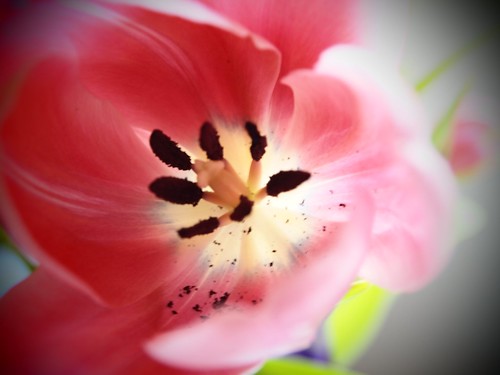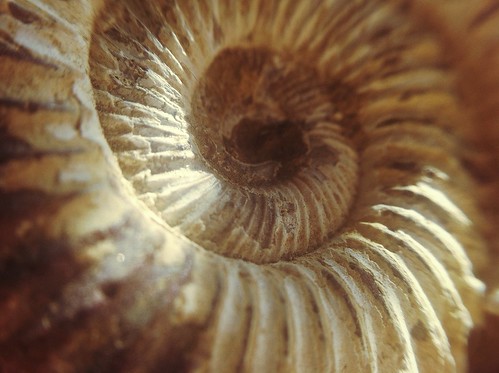She is 92, and growing backwards each day. She moves slowly now, each step shuffling, her walker preceding her. Her white hair shades to dark gray at the back of her head and stands up like baby-bird fluff when she wakes up in the morning. Her daughter bathes her each day, prepares her meals, tucks a long white towel into her collar to serve as a bib. Her oldest son visited her home island a few months ago, and called early one morning to ask for the street address of her old home. She doesn't remember.</ span>
Sometimes she doesn't remember how to brush her teeth and needs prompting. Sometimes she doesn't remember how to do her word search puzzle and needs to be prompted to look for the words in the jumble of letters. Likewise, I look for her among the jumble of memories. She tells her stories less and less these days - the stories of her father, who was wonderful with animals, had a dog named Prince, and worked with horses; stories of her mother being chided by neighbors for having "messy" hair when it was really just wavy (the same wavy hair that she inherited); stories of her mother making tofu or learning to bake Portuguese sweet bread on the plantation. The details erode.
Her daughter told me, many years ago, when the dementia was just setting in, that she felt like her mother had died. They used to eat lunch just about every day together - her daughter talking about office issues and dramas, the mother knowing each person's name and what they said last week. It took me so many years to realize what she meant, because I now feel the same way. While she sits across the room from me, poring over the paper (thankfully, she can still read), I remember who she used to be. The woman who talked on the phone with her sister, eyes closed, laughing, while her grandchildren puzzled over the bits of Japanese mixed into her English conversation. The woman who would do her weekly Long's shopping on Fridays. The brown paper bags she brought home inevitably contained a new Little Golden Book, which she'd read aloud to my sister and me before naptime. The woman who sliced and peeled apples for us - she said it was "brain food" - as we did homework at her kitchen table in the afternoons. The woman who taught me how to braid a My Little Pony's tail, bandaged scraped knees, and seemed to possess a never-ending supply of Oreos, Chips Ahoy, Cheetos, and more. Alas, she also seemed to possess a similarly abundant supply of dried prunes, kept in a glass jar in the fridge, that she'd pop into our mouths with a pair of chopsticks before we left her home in the afternoon, insisting it was good for the digestion.
She used to make me lunch and bring me snacks; now I do the same for her. She no doubt followed me closely on my first faltering steps, close enough to catch me if I fell - now I trail her with the same vigilance.
She mixes up some of her younger grandchildren, forgets what she had for dinner a few minutes ago. If I step out the door to get the mail and walk back in, she greets me with a cheerful hello because she doesn't remember that I was there just a minute ago. One thing she hasn't forgotten, however, is how to be thankful. She appreciates what she has, and will thank me - and anyone else - for doing everything from bringing her lunch to putting the rail up on the bed to remind her to stay there if no one's around.
A while back I noticed that I sometimes had a hard time telling her "you're welcome" when she told me "thank you." So I resolved to respond every time she said thank you. Doing this made me realize that in a way, I was angry at her. I was angry at her for not being angry about what she's lost, a loss that I feel acutely every time I remember who she used to be. I rage about the mysterious conditions in her brain that have blocked her off from her memories. "There is no pain so great as the memory of joy in present grief," Aeschylus says, and that's what I felt when writing this post. I grieve every day for the grandmother I've lost while she sits in the same room with me. As fast and as far as I shove the grief away, however, it circles back to hover behind me. I hover behind my grandmother in the same way as she shuffles to bed or her chair, ready to catch her if she falls. But I am afraid to let my grief catch me. I'm terrified that I will keep falling.
There is a lesson here, and as hard as I try to evade it, it seeks me out. My hard lesson. I'm afraid that I won't learn it before she leaves us, and I'm afraid I'll learn it while she's here, and have to be borne down by the heaviness of the grief. Today, I silently resolve, I will be patient, and kind. I will say "you're welcome" each time she thanks me, I will appreciate each time she says my name, because it means she hasn't forgotten me yet. I will try to see the grace and strength of this woman who raised me wholeheartedly, who goes on living and seeing all the beautiful little things around her, despite being one of the last of her siblings who are still living, despite the loss of her husband (it will be exactly 6 years since his death on Friday). Today, I will begin to appreciate the rare gift of spending a good part of the last two years caring for her, and I will pull my grief just a little closer to me, and learn its name - for we have been acquainted for a long time.




